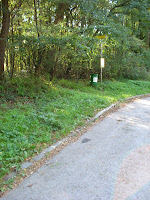 There was also a tongue-in-cheek sermon by a rather charismatic priest, a slight twist on the standard New Zealand "Christmas is a time for God and family, so beware of consumerism": "Christmas is a time for God and family, so beware of overeating."
There was also a tongue-in-cheek sermon by a rather charismatic priest, a slight twist on the standard New Zealand "Christmas is a time for God and family, so beware of consumerism": "Christmas is a time for God and family, so beware of overeating."The very early hours of Christmas Day I spent outside and very cold, cycling to Emily's along a road that seemed endless. Christmas morning I spent waking Emily up (she has a fondness for dozing), and then making pancakes that changed on the fly to French toast when we realised that neither of us had bought milk before Christmas Eve shop closing. Christmas afternoon I spent visiting a really, really nice German family whom the university had acquired on its drive for holiday-day adopters for its lonely foreign students. We went for a walk in the Black Forest, and then I was showered with home-made Lebkuchen.
On Boxing Day Simon arrived from Princeton, safe, and with hair ruffled only to the correct degree, and intact apart from his suitcase, which British Airways had sent to London. (It was last heard of yesterday in Basel. With luck it will make it to Germany by the time he leaves.) On the day after Boxing Day we went shopping for replacement clothing, and studied ("studied") representation theory. Two days after Boxing Day, or rather yesterday, we left for Cologne, where we are still now.
It's a city of a million people. It's one of Germany's smaller big cities, and I picked it more or less at random to go see: it had Roman ruins and Rhine frontage, and less of a journey to get there than Berlin or Munich, and sillier and friendlier people than Frankfurt. We caught a lift up with Jutta, whom I'd found on the miraculous car-sharing website Mitfahrgelegenheit, the penniless German student's primary mode of transport. She was from a small town south of Freiburg originally, where she'd been staying with her parents over Christmas, but lived now in Cologne, where she was heading back to for New Year.
 She agreed that people from Cologne were silly and friendly: the local dialect is exciting, though she couldn't describe it, and on New Year the people stand on the bridges over the Rhine and let off fireworks. We went to the hostel and dropped off our bags.
She agreed that people from Cologne were silly and friendly: the local dialect is exciting, though she couldn't describe it, and on New Year the people stand on the bridges over the Rhine and let off fireworks. We went to the hostel and dropped off our bags.We spent the evening with friends of friends, a middle-aged gay couple who run a dog-walking service in an eastern suburb. They were silly and friendly: they had a collection of miniature East German cars arranged on their mantelpiece, they served us pre-fizzed water, and we ended up chatting til midnight and crashing the night. They were also really interesting: we learned the German words for "nepotism", "deform", "taciturn" and "surveillance".
And today? The normal Saturday-sightseeing mix of sleeping in, wandering around, rushing through fantastic museums a little too close to closing time, and sitting exhausted in cathedrals pretending to pray. Dinner was a sausage Simon claims to consist of blood and fat, though I maintain it's only food colouring. Then we hung out in a cheap internet café with a loud Italian guy talking on Skype.
And then they all went home and had some toast. The end.


































